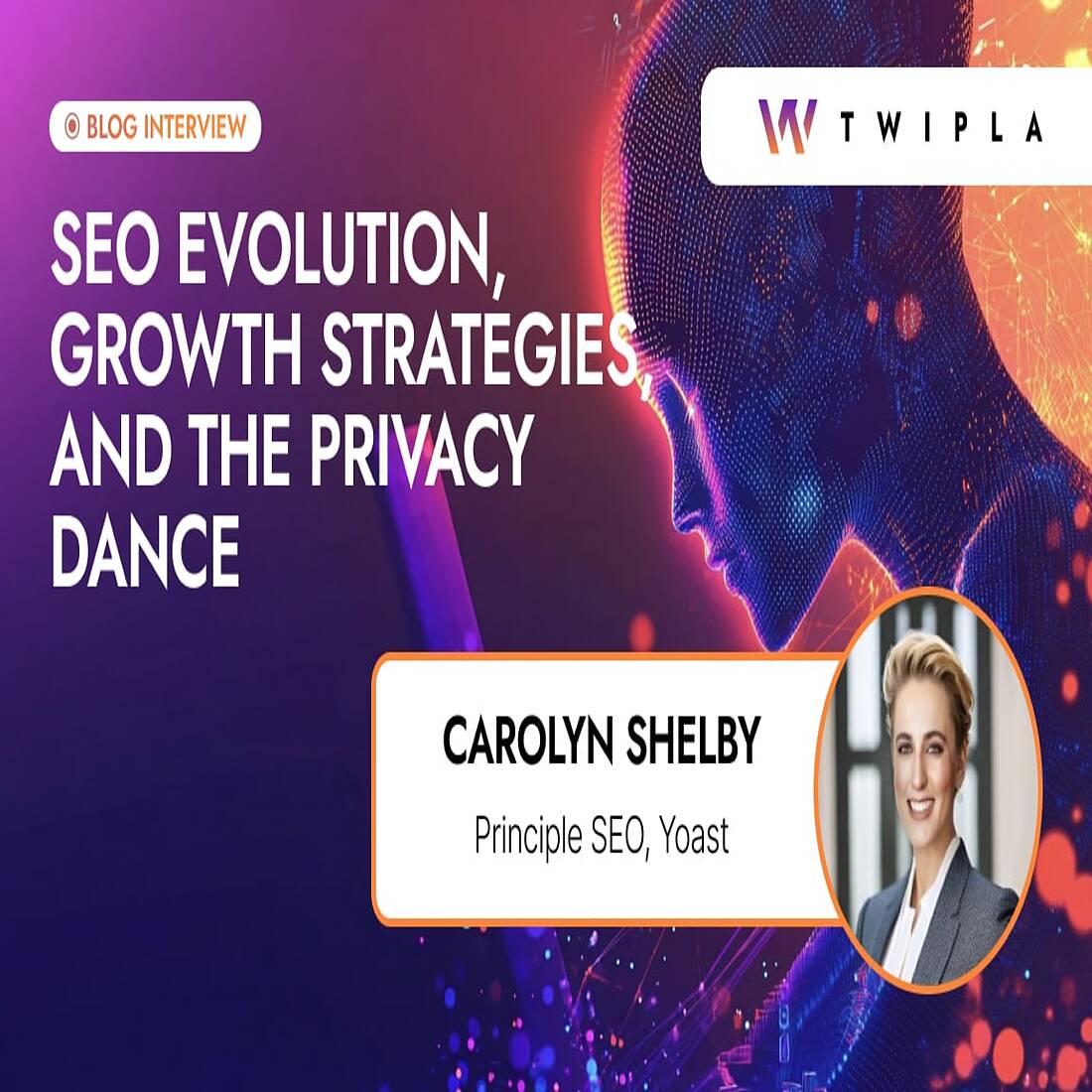- Why Us?
- Features
White Label
For SaaS Platforms & Agencies
Provide our complete analytics suite to your clients, directly within your own interface and with your/their own branding. Discover Analytics-as-a-Service and White Label Analytics. Great benefit, minimal effort.
- Pricing
- White Label
- Success Stories
- Partner
- ResourcesExpand Your Knowledge
CONTENTS
- What trends in SEO and website architecture should companies be preparing for, especially those aiming for large-scale growth and visibility?
- What are the key differences between enterprise SEO and traditional SEO strategies, and how do you approach them in your work?
- With the increasing focus on privacy regulations and cookieless tracking, how do you see the future of technical SEO evolving?
- About Carolyn Shelby

SEO Evolution, Growth Strategies, and Privacy-First Futures
As search evolves with tech advances and stricter privacy rules, TWIPLA’s Jorge Cuevas spoke with Yoast’s SEO head, AI expert, and podcast host Carolyn Shelby on best practices to stay competitive
What trends in SEO and website architecture should companies be preparing for, especially those aiming for large-scale growth and visibility?
In recent years, I’ve seen several trends in SEO and website architecture emerge that I think companies must prepare for, especially if their goals include scaling and driving substantial visibility. The most significant changes center around AI-driven search, core web vitals, and the increasing demand for modular and flexible site structures.
Search engines, particularly Google, are increasingly using AI to understand user intent and deliver more accurate search results.
This shift, which began with updates like Google’s MUM (Multitask Unified Model) and RankBrain, places a greater emphasis on semantic search, natural language processing (NLP), and entity recognition.
Companies should optimize their content to focus on intent and context rather than just keywords. Structuring content for AI means using schema markup, entity-based optimization, and crafting authoritative content that demonstrates expertise, experience, authority, and trustworthiness (EEAT).
The overarching priority needs to be communicating the relationships between topics and entities in ways that search engines can easily parse and understand.
Google’s emphasis on user experience through Core Web Vitals is only growing. This has placed a spotlight on site performance metrics such as Largest Contentful Paint (LCP), First Input Delay (FID), and Cumulative Layout Shift (CLS).
Websites need to be not only fast and mobile-friendly but also stable and smooth to navigate.
For large-scale sites, these metrics become even more critical because a site with thousands of pages can experience performance degradation quickly if not properly optimized.
Companies should invest in clean coding practices, CDNs, and caching solutions to meet these growing performance expectations.
Scalability and flexibility in site architecture are essential for long-term growth.
As businesses expand, their websites often become a patchwork of different platforms, plugins, and databases. This 'Frankenstein effect' can hamper SEO performance.
Moving toward a modular architecture where each section of the site (such as product listings, blog sections, and services) can be developed and optimized independently is critical for scalability.
Additionally, headless CMS solutions, which decouple the front-end and back-end of websites, allow for better flexibility in how content is presented across devices while maintaining SEO integrity.
These architectures make it easier to manage complex, multi-regional, and multilingual SEO setups while ensuring consistency in technical SEO standards.
As search engines evolve, structured data remains a critical component of SEO strategy.
Websites that provide rich, structured data enable search engines to better understand and present their content through rich snippets, knowledge panels, and AI-generated summaries.
Structured data also plays a key role in voice search optimization, which is gaining importance as more users adopt voice assistants.
The future of search will involve zero-click searches, where Google provides answers directly on the results page, meaning that companies need to ensure their content is structured and authoritative enough to be the source of these answers – and that ties back to developing/optimizing EEAT.
What are the key differences between enterprise SEO and traditional SEO strategies, and how do you approach them in your work?
The core principles of SEO apply universally, but enterprise SEO presents unique challenges that require different strategies compared to “traditional” SEO. In my experience, the main differences between enterprise and traditional SEO are scale, complexity, and stakeholder management.
Enterprise SEO operates on a massive scale, with websites often containing tens of thousands (or even millions) of pages.
This introduces significant challenges in maintaining technical SEO hygiene across the site. Issues like duplicate content, crawl budget optimization, and site speed become exponentially more critical.
Automation plays a huge role in enterprise SEO, where tools that can monitor and correct issues in real-time, such as log file analysis, automated reporting, and dynamic sitemaps, are essential.
With so many pages, enterprise sites need systems that efficiently scale without requiring constant manual intervention. This also applies to content strategy, where enterprises must deploy large-scale content optimization initiatives that balance quality with quantity.
Enterprise sites are often built on legacy systems or involve multiple content management systems (CMS) and platforms.
This complicates efforts to align SEO best practices across the different systems.
A key part of enterprise SEO is harmonizing these separate, and sometimes not well connected, systems and ensuring that the technical foundations of the site are optimized.
This means working closely with IT teams, developers, and other stakeholders to ensure that website changes don’t inadvertently damage SEO performance.
Regular audits are crucial to catching technical debt or 'Frankenstein-like' structures that can creep into an enterprise site over time.
With multiple teams and departments contributing content, content governance is a significant factor in enterprise SEO.
Maintaining a consistent voice, tone, and SEO strategy across departments requires a robust editorial process.
Enterprises also need to manage how content silos - where different departments may create overlapping or conflicting content - affect SEO performance.
To manage this, I advocate for centralized SEO guidelines and content frameworks that allow teams to operate independently while ensuring consistency in strategy and execution.
Having SEO experts embedded within content creation processes can make a substantial difference in aligning all content efforts with the overall SEO goals.
One of the most challenging aspects of enterprise SEO is stakeholder management.
SEO is a long-term strategy, and getting executive buy-in across various departments (e.g., marketing, IT, product) is vital.
Many enterprise SEO initiatives require cross-departmental collaboration, such as technical SEO fixes that rely on developer resources or content creation efforts that involve multiple teams.
A successful enterprise SEO strategy involves not just optimizing for search engines but also managing internal stakeholders, communicating the value of SEO, and aligning SEO goals with broader business objectives.
Regular reporting and clear KPIs are key to maintaining stakeholder engagement and support.
Unlike smaller businesses, enterprise companies often have well-established brands.
In these cases, the SEO focus shifts toward brand authority, website credibility, and reputation management.
For enterprise companies, SEO isn’t just about ranking for keywords; it’s about ensuring that they maintain a positive and authoritative presence across all digital touchpoints.
This involves actively managing reviews, optimizing branded search terms, and controlling how the brand is presented in rich results and AI-generated search overviews.
Enterprise SEO requires a unique approach because it operates at such a large scale, involves complex systems, and requires significant coordination across teams. My approach focuses on systematic optimization, automated solutions, and cross-team collaboration to drive sustainable, long-term growth.
With the increasing focus on privacy regulations and cookieless tracking, how do you see the future of technical SEO evolving?
Google recently announced that it will delay the phase-out of third-party cookies in Chrome until early 2025.
This decision comes in response to competition concerns and the need to develop more effective privacy alternatives. The delay also gives Google time to introduce a new user experience, allowing users to make informed choices about how their data is used across all web browsing.
This follows multiple delays, including a two-year postponement in 2021, and requests from regulatory bodies such as the UK’s Competition and Markets Authority (CMA). Despite this, browsers like Firefox, Brave, and Safari have already blocked third-party cookies, which signals that resistance to the cookieless future is futile. As we approach this new era of privacy-first browsing, SEO strategies will need to adapt.
With the impending elimination of third-party cookies, businesses will need to lean heavily on first-party data - data collected directly from their own websites.
This makes SEO even more essential, as it naturally drives organic traffic and allows businesses to collect valuable insights directly from their users.
As companies shift toward privacy-conscious data collection, SEO teams need to collaborate closely with analytics and data departments to optimize opt-in mechanisms and build strategies that prioritize long-term data collection.
Privacy-first web design will play a major role in SEO success, especially as regulations like GDPR and CCPA continue to enforce strict guidelines on user consent.
Google has already introduced Core Web Vitals as a measure of user experience, and I expect this to expand into areas like privacy design patterns — features that make consent, data collection, and user control transparent.
Websites that are built to provide users with clear, consent-driven experiences will likely see better performance in search rankings, as search engines increasingly favor sites that prioritize user privacy.
Without third-party cookies, contextual targeting will become a primary method for delivering relevant content to users.
Search engines are improving at understanding the intent behind searches through the integration of AI, which processes natural language and recognizes entities more effectively.
This shift should push SEO professionals to focus on entity-based optimization and developing content that resonates based on user intent instead of personal tracking data.
Contextually relevant content that satisfies user queries while respecting privacy will be rewarded in search results.
As the industry moves away from cookies, server-side tracking and privacy-compliant analytics solutions are gaining traction.
SEO professionals will need to integrate these solutions to ensure accurate measurement without infringing on user privacy – and they should start working on this now and not wait until the last minute before Google deprecates third-party cookies.
This will likely involve more aggregate data models, where insights are derived from anonymized data.
Tools that can provide cookieless tracking while remaining compliant with privacy laws will become increasingly important for maintaining robust SEO strategies.
The shift to a privacy-focused web could lead to more non-personalized search results, where search engines focus less on user behavior and more on intent.
This means that SEO strategies may need to focus more on high-intent, broad keywords that resonate across a wider audience rather than relying on personalized search outcomes.
As search engines prioritize relevant, authoritative content in non-personalized searches, businesses must ensure their websites are optimized to deliver highly valuable and comprehensive answers to user queries.
As privacy becomes more critical, building trust through transparency will be paramount.
Websites that can demonstrate privacy compliance, offer clear consent mechanisms, and provide strong trust signals (like SSL certificates, secure data handling, and visible privacy policies) will be favored by both users and search engines.
SEO strategies should focus on promoting these trust signals, ensuring that websites not only comply with privacy laws but also actively communicate their commitment to user privacy.
While Google’s delay in phasing out third-party cookies may provide more time to adapt, the overall shift towards a cookieless and privacy-first digital landscape is coming.
SEO professionals must be prepared to evolve their strategies by focusing on first-party data, user experience, and privacy-centric optimization.

About Carolyn Shelby
As the Principal SEO for the number one Wordpress SEO plugin, Yoast's Carolyn Shelby is uniquely positioned to offer expert insights on optimizing search strategies. With over two decades in digital marketing, Carolyn's career includes co-founding an ISP, enhancing SEO for major clients like Tribune Publishing and ESPN, and advancing Yoast's SEO plugin. Passionate about the digital landscape, she's a self-proclaimed coding geek, speaker on the tech circuit, and host of the popular "SEO Updates by Yoast" podcast.
Share article
Get Started for Free
Gain World-Class Insights & Offer Innovative Privacy & Security













